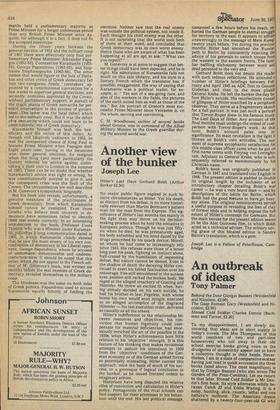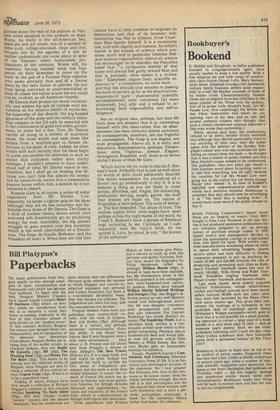An outbreak of ideas
Tony Palmer
Behind the Door Giorgio Bassani (Weidenfeld and Nicolson, £2.00) The Gasp Romain Gary (Weidenfeld and Nicolson, £2.50) Stoned Cold Soldier Charles Dennis (Bachman and Turner, £2.20) To my disappointment, I am slowly discovering that ideas are in short supply in today's novels. The Mrs Thompsons of this world (mothers of two and part-time housewives) who toil away in their old school exercise books giving voice to the drudgeries of domesticity appear not to have a collective thought in their heads. Nevertheless, I am in a state of comparative ecstasy having just read in quick succession the three books listed above. The most magnificent is that by Giorgio Bassani (who also wrote The Garden of the Finzi-Continis). Let me return to that later. Stoned Cold Soldier is Mr Dennis's first book. Its style alternates wildly between Catch 22 and Eddie Waring. It is a noisy, bustling, slick, caustic, lethal and one helluva'n outburst. The American dream shattered by a twenty-four-year-old GI who gunned down the rest of his platoon in Vietnam while smashed to the eyeballs on dope. Worse, he really is the all-American boy, aPple-pie and ice cream, son of a senator or some such, college-educated, clean and cool, brought low by the agonies of a war he neither understands nor cares about in spite of his frequent albeit fashionable protestations to the contrary. Worse still, his superiors, having realised what has happened, do their damndest to cover up the truth to the gall of a Pulitzer Prize reporter Who seeks precisely that and of a lawyer hired by the lad's father to prevent his son from being convicted or court-martialled or both of crimes the father is sure his son could not do. In short, an all-American tragedy.
Mr Dennis doth protest too much occasionally and widens his tale to include such discussions as the relative merits of mysticism, the hypocrisy of the church, the pig-headed ignorance of the army and the military-industrial complex in the US with its essential role in the continuance of good and stable government, to name but a few. True, Mr Dennis carries all along in a torrent of scurrilous abuse. He loves words and uses them like bullets from a machine-gun to flatten objections to his point of view. Indeed, he often writei with such ferocity that his ideas begin to jostle one another for attention to such an extent that confusion rather than clarity emerges. I wouldn't pretend to have understood half of what Mr Dennis wants to say, therefore, but I shall go on reading him because you can't help but admire his energy and be instinctively aware that a tremendous Passion burns within him, a passion he is not ashamed to impart.
Romain Gary is, of course, a writer of wider experience than Mr Dennis. Consequently, he keeps a tighter grip on his ideas although they are no less tenacious and for
midable than those of Mr Dennis. The Gasp is a kind of nuclear fission device which once , activated will theoretically go on producing energy for ever. Inevitably, the big powers
struggle to gain control over this invention Which is the work (inevitably) of a Frenchman. The Pope, de Gaulle, Brehznev and the President all want it. When they are told they cannot have it, they combine to engineer its destruction and that of its inventor who meanwhile has fled to Albania. Even Chairman Mao bestirs himself. It is a cautionary tale, told with dignity and sadness. Its subject matter is the misuse of science which promises much and in particular limitless freedom without responsibility. Above all, science has encouraged us to abandon the Pascalian belief that "a civilisation worthy of that name will always feel guilty toward Man and that is, precisely, what makes it a civilisation." Elsewhere, argues Gary, scientific endeavour is " a compulsion, an inner must... . and that the attitude that consists in passing the buck to society as far as the practical consequences of' pre ' disinterested ' scientific accomplishment were concerned [is] mere whitewash, [an] alibi and a refusal to acknowledge both responsibility and self-indulgence."
Not an original idea, perhaps, but then Mr Gary does not pretend that it is, contenting himself with the observation that its abandonment has been hitherto almost universal; its consequences, therefore, are too frightful to contemplate. The Gasp is not dogma, nor even propaganda. Above all, it is witty and discursive. Argumentative, perhaps. Tendentious, even. Vigorous, always. Elegant, throughout. Readable, well, there is no better stylist I know of than Mr Gary.
Which leaves me no room to discuss S. Bassani's book. Probably that is just as well since no words of mine could adequately describe this minor masterpiece. Do yourselves all a favour and go immediately to buy It. It is as delicate a thing as you are likely to come across, effortless, sad, fragile, life-enhancing, profoundly moving, simple, gentle, the stuff that dreams are made on. The nature of friendship is here defined. The ache of betrayal. The bed despoiled. The abuse of trust. The endless nights when what-might-have -been gallops across the nightmares of the mind. As I read S. Bassani's book a phrase of Rimbaud kept occurring to me. Curiously, as I subsequently read Mr Gary's book, he too quoted it. Love, he noted, is only" the known of the unknown."



































 Previous page
Previous page